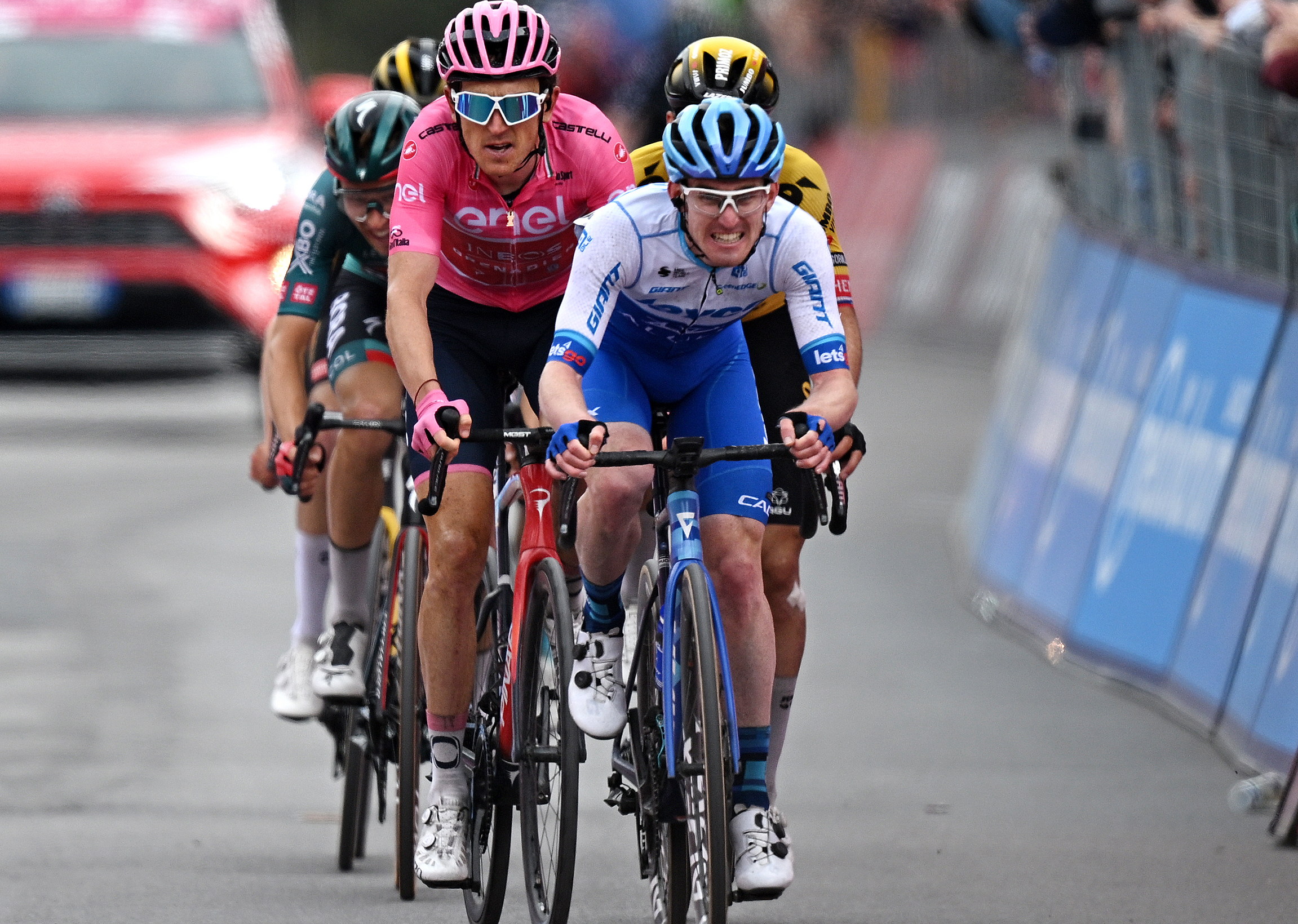
Most mornings when Eddie Dunbar walks into the mixed zone at the Giro d’Italia, somebody invariably suggests that a man from Banteer in County Cork should be revelling in the rain that has so conditioned this race.
His own view is more nuanced. “I tolerate it,” Dunbar told Cyclingnews. “Obviously, I grew up with bad weather, but I don’t want to race in it, nobody does. Anyone who says they do is talking shite, basically.”
Dunbar hasn’t missed a beat on this Giro, and so when his name was missing from the provisional general classification results published immediately after the finish of stage 14 on Saturday, it was clear that something was awry.
At every major rendezvous, most notably the summit finishes at Gran Sasso d’Italia and Cran Montana, the Irishman has been present and correct. And, despite the initial confusion, he was indeed safely aboard the peloton as it ambled towards the finish in a sodden Cassano Magnago at the weekend.
It was, however, a close-run thing. After avoiding the misfortune that had bedevilled so many GC men in this race across the first two weeks, Dunbar’s challenge risked unspooling here due to an untimely puncture. Mercifully, a minor disaster was averted when his Jayco-AlUla teammate Campbell Stewart stopped and handed over his bike.
“With 7k to go, I hit a hole and I got a rear wheel puncture,” Dunbar explained. “It was quick thinking from Campbell, so we were back up and running quickly. There was a delay afterwards with the results because I didn’t have my transponder on the bike and my number wasn’t showing under my rain jacket. I think a few people were worried, but it was all good, thankfully.”
A day later, Dunbar was, as ever, precisely where he needed to be in the finale of a GC day on this Giro, tracking the acceleration from João Almeida (UAE Team Emirates) on the short, sharp climb through Bergamo Alta. He finished the race safely alongside Geraint Thomas (Ineos Grenadiers), Primož Roglič (Jumbo-Visma), et al, and he reached the second rest day of the Giro in eighth overall, 3:40 down on ephemeral maglia rosa Bruno Armirail (Groupama-FDJ).
In the grand scheme of things, Dunbar is where he wanted to be when this race set out from Abruzzo two weeks ago, firmly in the hunt for a high overall finish in Rome. The Giro marked his return to Grand Tour racing after a four-year absence and the first real test of a new phase of his career. After four-and-a-half seasons deployed largely as a deluxe domestique at Ineos Grenadiers, the Irishman was handed the opportunity to lead at Jayco-AlUla last winter.
“I think the main thing in a Grand Tour is being consistently good every day. If you can avoid the bad days and limit your losses where you can, I think you’re always going to be there or thereabouts in the fight,” said Dunbar, who approaches the third week of the Giro heartened by the experience of his previous appearance in 2019.
On that occasion, of course, Dunbar was riding in the service of Pavel Sivakov rather than with an eye to the general classification, but he came away from Italy more convinced than before of his powers of endurance.
“I actually got better in the third week, which is always a positive, so hopefully next week will be the same,” Dunbar said. “That was four years ago, so it’s a bit different, but I’ve done all the training I can. Now it’s up to the race itself to decide how it goes.”
Leader
In Irish cycling circles, Dunbar’s talent was heralded from the moment he began racing and winning on all terrains with Kanturk Cycling Club as a teenager. As an amateur, his aggressive instincts caught the eye, from his long but doomed raid at La Côte Picarde in 2015 to his solo victory at the under-23 Tour of Flanders two years later.
As a professional, Dunbar’s gifts were eventually diverted towards stage racing. His time at Ineos saw a fine cameo at the 2021 Tour de Suisse and overall victories at Settimana Internazionale di Coppi e Bartali and Tour de Hongrie last year, but the move to Jayco-AlUla has put him in an entirely new position. The role as an outright leader is unfamiliar, but Dunbar has quietly got on with the task in hand on this Giro.
“I’d rather lead by example and lead by how I’m going on the bike. I’m not a big talker, but if I have something to say, I’m not afraid to say it or anything like that,” Dunbar said. “Obviously, it’s only my second Grand Tour. It’s a learning experience for the team on how I work and I’m still learning myself how I work in these circumstances.”
This has been, in many ways, a Giro that has run counter to Dunbar’s own attacking instincts. The caution among the main general classification contenders has led to a tense, tightly-controlled race to this point, though Dunbar couldn’t resist testing the waters with late accelerations at Gran Sasso and again at Crans Montana. On each occasion, he found Thomas and Roglič were reluctant to let any podium contender snaffle so much as a second.
“I don’t think anyone wants to give away anything on this Giro. No one knows what’s around the corner, so that’s probably why it’s being raced in the style that it is,” Dunbar said. “But there’s three days next week that are going to sort the men from the boys, I think you could say.
“Let’s see how that goes. I think that’s where you’re going to see the real fireworks. Anyone who’s been conservative can make a big difference next week, and I think everyone knows that, hence the racing you’re seeing.”







